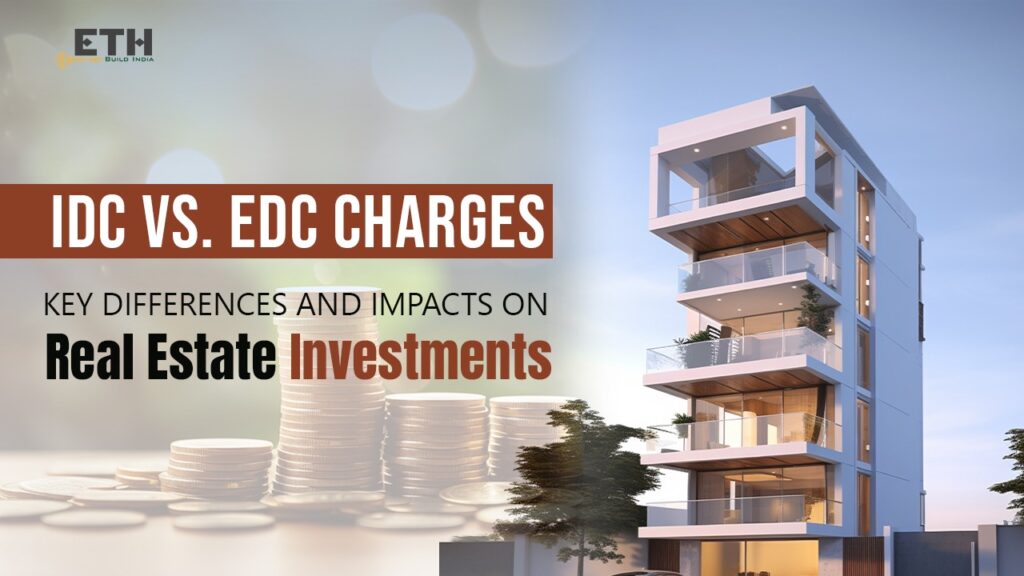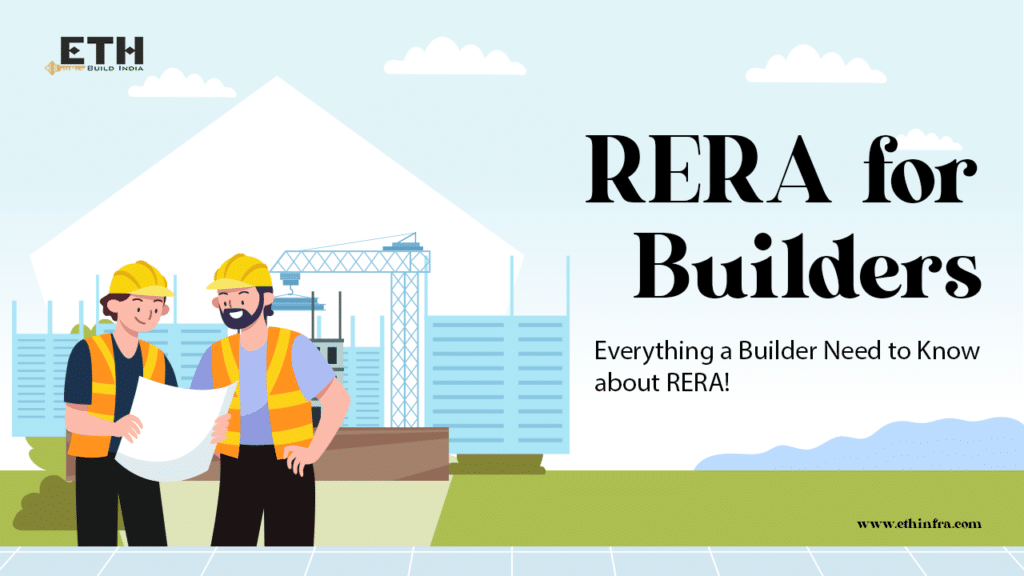When we invest in the real estate sector, it becomes very important to understand the financial components. There are many aspects of real estate finance hidden from the normal people. However, IDC and EDC are some of the most crucial financial terms every buyer must understand. These charges can greatly affect the total cost of a property and impact your investment returns.
State governments levy a variety of development costs on builders, including infrastructure, license and permit fees, institution of land use, modification of land use, and scrutiny fees. Infrastructure charges, including EDC and IDC charges, are gathered by the state to fund the construction of local and state-wide infrastructure. Now let’s examine the meanings and applications of IDC and EDC charges.
What are IDC charges in Real Estate?
IDC is the fees imposed by state govt on property developers to fund infrastructure projects within a specific development area. These projects can include roads, bridges, and utilities. The IDC helps in the development of the necessary infrastructure and enhances property value. You can calculate IDC on the basis of location, project size, and other development requirements issued by the state government.
Understading External Development Charges (EDC)
EDCs, on the other hand, are charges imposed to pay for upgrades to the external infrastructure that are made outside of the immediate development area. These fees support the greater infrastructure network, which benefits an area that extends outside the development site and includes public utilities, major roadways, and sewage systems.
EDC is mandated by the Real Estate Regulation and Development Act (RERA 2016). Area’s Floor Area Ratio (FAR) can help you calculate the External Development Charges. Consult your developer or visit the DTCP (Department of Town and Country Planning) website.
What are the key Differences Between IDC and EDC?
| Aspects | Internal Development Charges (IDC) | External Development Charges (EDC) |
| Definition | Charges levied by the developer for internal infrastructure development within the project. | Charges imposed by the government or local authority for infrastructure development outside the project site. |
| Purpose | To cover the development cost of internal amenities such as roads, parks, water supply, sewage, and electricity within the project boundaries. | For the development of external infrastructure such as roads, water supply, sewage systems, and power supply that connect the project to the city’s main infrastructure. |
| Imposed By | Real estate developer or builder of the project. | State government or local municipal authority. |
| Legal Requirement | May or may not be regulated by local authorities, depending on the region. | Mandated by local government regulations and is a compulsory charge. |
| Impact on Buyers | Directly affects the quality of internal amenities in the society. | Provides accessibility and connection to essential public services and infrastructure. |
How IDC and EDC Charges Impact Your Real Estate Investments?
Impact on Property Costs
If you pay both IDC and EDC, then this can be the reason to increase the total cost of acquiring property by 15-20%. That’s why investors should understand the concept of these charges. Also, it helps to calculate the overall cost of development and return on investment (ROI). If the cost of IDC and EDC is higher, then it will reduce the profitability of a project and may show rice in the property prices to the buyer.
Influence on Property Values
IDC: If you pay the charges of IDC, it improves the local infrastructure and increases the attractiveness of a property. A well-maintained roads and parks can provide high property appreciation and attract a large number of buyers.
EDC: If you invest your money in the EDC, it will develop the infrastructure externally and also increase the property values. Areas with well-developed external infrastructure usually experience higher demand and increased property values.
Financial Planning for Developers
Every real estate developer should consider IDC and EDC charges as they are critical components of financial planning. They must include these costs in their budgets and pricing strategies. If you underestimate these charges, it can lead to financial shortfalls.
Investment Decision-Making
Investors should know everything about the IDC and EDC charges when evaluating real estate projects. Properties with high charges offer lower returns if you don’t get high property appreciation or rental income.
Grasping the concepts of Occupancy Certificate (OC) and Completion Certificate (CC) is equally important as EDC & IDC charges because they play a vital role in ensuring that a property is legally fit for occupation and fully compliant with building regulations. To dive deeper, check out our detailed guide on Occupancy Certificate and Completion Certificate.
How to Manage IDC and EDC Charges?
Research and Planning
Understand Local Regulations: Different regions have different regulations and charge structures. Make thorough research on IDC and EDC rates in your target area.
Include in Budgeting: Include charges into the budget of your project and avoid financial surprises. If your budget is accurate, it will cover all the costs and help maintain financial stability.
Evaluate Development Opportunities
Determine the Impact on ROI: Analyze how EDC and IDC charges affect your return on investment. Consider both the immediate costs and long-term benefits.
Explore Incentives: Some places offer incentives or reductions on infrastructure charges. Find the possibilities to reduce the financial burden.
For a comprehensive understanding of real estate transactions, it’s also essential to familiarize yourself with key documents such as the Sale Deed and the Agreement to Sale, which play crucial roles in the property buying process
Conclusion
The role of IDC and EDC charges in real estate investments can determine the actual cost of the property and how much return you can expect from it.
Making an informed decision while buying a property can be a crucial task. Simply understanding these terms and accumulating their cost can benefit you in various ways.
You can avoid surprise elements and guarantee a smoother property buying experience by being aware of local differences and taking the initiative to gather information.
For those looking to enhance the positive energy in their living spaces, consider exploring these Vastu tips for home to complement your real estate investment and create a harmonious environment
Frequently Asked Questions
What are IDC charges in real estate?
IDC (Internal Development Charges) are fees imposed by the state government on property developers to fund infrastructure projects within a specific development area. These projects include roads, bridges, and utilities that enhance the property value.
What are EDC charges in real estate?
EDC (External Development Charges) are fees imposed by the government to pay for infrastructure development outside the immediate development area, such as major roadways, public utilities, and sewage systems. These charges help improve the overall infrastructure network that benefits the surrounding area.
How do IDC and EDC charges differ?
IDC charges are levied for internal infrastructure development within the project site, while EDC charges are imposed for external infrastructure development outside the project area. IDC is usually managed by the developer, whereas EDC is mandated by the state government or local authority.
Why are EDC and IDC charges important in real estate investments?
EDC and IDC charges can significantly impact the total cost of acquiring a property. Understanding these charges helps investors calculate the overall development cost and return on investment (ROI). High IDC and EDC costs can reduce profitability and affect property prices.
How do IDC charges impact property values?
Paying IDC charges can improve the local infrastructure within the project area, such as roads and parks, which can lead to higher property appreciation and attract more buyers.
How do EDC charges impact property values?
EDC charges help develop external infrastructure, increasing property values in areas with well-developed external infrastructure. These areas often experience higher demand and appreciation in property values.
Are IDC and EDC charges mandatory for all real estate projects?
EDC charges are mandatory as they are regulated by local government laws. IDC charges, however, may or may not be mandatory, depending on local regulations and the developer’s practices.
How do IDC and EDC charges affect a buyer’s investment?
IDC and EDC charges can increase the overall cost of property acquisition by 15-20%. If these costs are high, they can reduce the potential return on investment, making it important for buyers to understand and account for these charges when investing.
Can developers include IDC and EDC charges in their pricing strategies?
Yes, developers should consider IDC and EDC charges in their financial planning and pricing strategies. Underestimating these costs can lead to financial shortfalls and affect the project’s profitability.
How can buyers manage IDC and EDC charges effectively?
Buyers can manage IDC and EDC charges by researching local regulations, including these charges in their budgeting, evaluating the impact on ROI, and exploring any available incentives or reductions in infrastructure charges.




